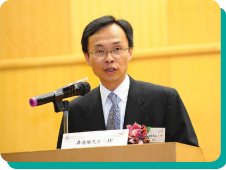 |
Entering into the second decade in the 21st century, Hong Kong has seen rapid societal and economic changes. Our population has grown to over seven millions with the number of senior citizens increased by 27% within the decade while the average domestic household size decreased from 3.1 in 2001 to 2.9 in 2011. Births and inflow of One-way Permit Holders are important constituents of the overall population increase, but with about 45% of the births born to Mainland Women in 2011. Divorce has increased for about 35% in the recent decade, resulting in a considerable number of single-parent families in the community. Our economy has developed into a knowledge-based one with rapid changes in information and communication technologies and demand for low-skilled or manual labour has rapidly decreased, resulting in decrease of income of most families whose breadwinners are low-skilled or manual labourers and widened income disparity in the community. To meet the societal and economic challenges, the total recurrent government expenditure on social welfare has increased by 41% over the past decade from $27 billion in 2000-01 to $38 billion in 2010-11. For years, government spending on social welfare has grown continuously. In 2010-11, the government’s spending on social welfare ranked the second amongst various government expenditures signaling the importance our government has accorded to social welfare. At the same time, we continue to join hands with the welfare sector as well as the business community and uphold our determination and commitment in building a caring society.
I am pleased to share with you some of our notable achievements in the past two years.
We concluded district-based pilot projects, including Neighbourhood Support Child Care Project, Integrated Community Centre for Mental Wellness and Carer Training, launched to timely meet the needs of people in the locality. With proven effectiveness, these projects have been regularised and extended throughout the territory.
We introduced innovative mode of service delivery to address the changing help-seeking behavior arising from development in the information and communication technology by subventing a new web-management service to reach out to internet users with suicidal ideation and promote positive life attitudes.
We deliberated on how best to provide support to the vulnerable and disadvantaged groups. On the social security side, apart from providing a safety net, we continued to encourage self-reliance through various employment assistance programmes. During the difficult time brought about by the global financial crisis, we provided additional one-off financial assistance. On the service side, we launched the Victim Support Programme to victims of family violence, the Short-term Food Assistance Service Project, the pilot schemes on Home Care Services for the Frail Elders on the waiting list for nursing home services and Home Care Service for Persons with Severe Disabilities, a pilot scheme to provide residential care homes for the elderly with subsidised visiting pharmacist services, the pilot Bought Place Scheme for private residential care homes for persons with disabilities and the pilot project on Enhanced Probation Service, etc.
We continued to promote multi-partite partnership through the Partnership Fund for the Disadvantaged and the Child Development Fund. We encouraged volunteerism in different sectors that covered all walks of life and the achievements in promoting corporate social responsibility were spectacular. We collaborated with the Radio Television Hong Kong and produced a docu-drama series to arouse public awareness and concern on issues of domestic violence and encourage needy people to seek early assistance.
At the district level, our District Social Welfare Officers continued to act as focal points in their respective districts with strengthened partnership with District Councils, local communities, local organisations, subvented and non-subvented welfare non-governmental organisations, government departments and other stakeholders including the business sector, etc. They played a pivotal and important role in developing social capital and mobilised local and community resources to timely meet their distinctive district needs. The solidarity and self-initiated mutual help during the tragic incidents of the collapse of an old tenement at Ma Tau Wai Road, the fire at Fa Yuen Street and the flood in Tai Po all demonstrated seamless collaboration amongst government, non-governmental and community organisations. Efforts to address the multi-faceted and multi-cultural needs of different minority groups to foster social cohesion were also evident in our district work.
Against the global economy and local social scene, we acknowledge that we will be facing tremendous challenges ahead with increasingly complex social issues and rising public demands for quality social welfare services against limited resources. Yet, with the solid foundation that had been laid over the years and the joint effort of all, we are confident that we shall be able to embrace the challenges ahead and continue to improve people’s well-being and livelihood through service consolidation and enhancement
.
| |
NIP Tak-kuen, Patrick, JP
Director of Social Welfare |
|